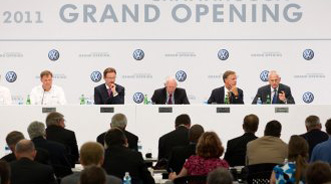VW Opens U.S. Plant

By subscribing, you agree to receive communications from Auto Remarketing and our partners in accordance with our Privacy Policy. We may share your information with select partners and sponsors who may contact you about their products and services. You may unsubscribe at any time.
CHATTANOOGA, Tenn. –
Volkswagen is officially producing vehicles in the U.S. The German automaker held an inauguration ceremony Tuesday for the new plant in Chattanooga, Tenn., which will produce the VW Passat.
VW said it wants to build upon its presence in the ever-important U.S. market. This could be crucial for VW as it chases Toyota as the world’s largest automaker.
The company said it is aiming for annual U.S. sales to eclipse 1 million by 2018 and command about a 6-percent market share. This Tennessee plant, VW said, is pivotal to these goals.
The plant can built 150,000 vehicles annually and VW plans for the manufacturing depth for the Passat to be at 85 percent.
VW stressed that the Passat, which will be designed specifically for U.S. customers, together with the VW Jetta — which is built in Mexico — are the core pieces of VW’s North American strategy.
And when the next Beetle is rolled out, it “will pick up the threads of the brand’s legendary heritage in the United States,” officials noted.
Subscribe to Auto Remarketing to stay informed and stay ahead.
By subscribing, you agree to receive communications from Auto Remarketing and our partners in accordance with our Privacy Policy. We may share your information with select partners and sponsors who may contact you about their products and services. You may unsubscribe at any time.
The inauguration of the plant comes almost three years after the factory was first announced. At the time — July 2008 — the financial, economic and auto market meltdown had not yet surfaced.
Its construction started in 2009. In building it, the automaker has crafted a plant that features a body shop, paint shop, assembly facility, technical testing center, employee training academy and an eight-company supplier park.
“The Volkswagen Group has finally arrived as a local manufacturer in the United States,” Martin Winterkorn, the chairman of the board at Volkswagen AG, said at Tuesday’s ceremony.
The inauguration was attended by U.S. Secretary of Transportation Ray LaHood; Klaus Scharioth, the German Ambassador to the U.S.; Tennessee Gov. Bill Haslam; VW Group of America president and chief executive officer Jonathan Browning; and the state’s U.S. Sens. Robert Corker and Lamar Alexander.
“We are proud to be part of this great automobile nation as a producer, an employer and as a friend and good neighbor to people in the region,” Winterkorn added.
The plant will have more than 2,000 employees, the automaker said. VW already has 1,700 direct employees in Chattanooga and said the plant will help foster 10,000 more jobs throughout the component supply segment in the U.S.
What’s more, VW is pumping roughly $1 billion to develop the plant. It contends the Chattanooga facility — already adhering to the top U.S. Leadership in Energy and Environmental Design standards — is one of the most eco-friendly auto plants in the world.
For instance, VW has employed a filler-less painting process, leading to a cut of roughly 20 percent of carbon-dioxide emissions, it says.
VW — which said the plant adheres to the “most stringent requirements” for water efficiency — has developed what it says is the first auto paint shop to ever employ a waterless separation process for applying the top coat of paint.
The plant also uses rainwater, which helps drop its water consumption to a level lower than a typical plant of its size.
Moreover, its outdoor lighting is completely reliant upon LED systems. VW said this is the first of its plants to employ LED for all of its outer lighting.
Another energy-saving measure includes motion sensor-controlled lamps for the production buildings and offices.
All told, VW said the plant’s lighting system’s energy usage is about 20 percent less than a typical plant of its size.
"Think Blue."
Moving along, in another eco-friendly move from the company, and in conjunction with the new plant opening, VW launched a “Think Blue.” campaign. This is designed to foster environmentally friendly mobility from an industry perspective and to create ideas for eco-sustainable day-to-day living among the general public.
This U.S. campaign — which debuted Monday — goes along with the aforementioned plant inauguration and VW’s partnership with New York’s Museum of Modern Art.
Print advertisements, online measures and billboards near MoMA and the Chattanooga plant were launched to get the campaign rolling. VW will follow up with national marketing efforts.
“’Think Blue.’ bears witness to our holistic understanding of sustainability,” Browning said.
“On the one hand, the new Volkswagen plant in Chattanooga demonstrates just how eco-friendly and resource saving automobile production can be today,” he indicated. “And on the other, we are seeking to intensify our dialog with art and society on key issues of the future through our cooperation with MoMA.”


